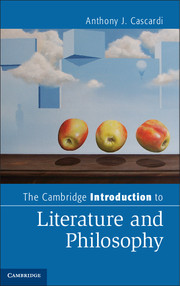Introduction
Published online by Cambridge University Press: 05 June 2014
Summary
Literature and philosophy are very much like two family members: sometimes they quarrel furiously, and other times they get along quite well, either by ignoring one another’s existence or by believing that they share every possible interest. This book is an introduction to the kinship that lies at the root of their relationship and their quarrels. It begins by explaining that, like the members of most every family, they share a history that bears upon all their dealings. That history is at least as old as Plato, who refers to it as “ancient.” Its implications for the present are numerous. The literary challenges to philosophy, no less than some philosophical resistances to literature, persist in part because their respective proponents believe that there is something of essential value that the other fails to see. But the subject of this book is not just their differences. The affinities between philosophy and literature are substantial and deep; indeed, the differences in question would scarcely matter except for the fact that literature and philosophy share some essential concerns. Matters of truth, of value, and of form – which I adopt as the organizing categories of this Introduction – are not the exclusive province of either one. Yet literature and philosophy nonetheless tend to proceed in very different ways (and sometimes with different consequences) in their approach to these issues. This Introduction offers a way to make sense of the affinities and the differences that seem most consequential between them. It gives a broad picture of a field that is sometimes quite contested but, beyond that it explains why literature and philosophy ought to matter to one another, even when they do not always recognize this need.
- Type
- Chapter
- Information
- Publisher: Cambridge University PressPrint publication year: 2014



